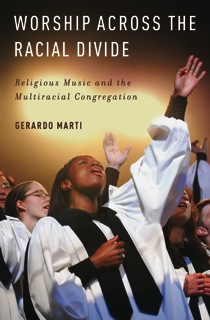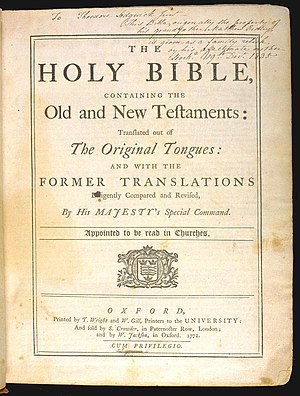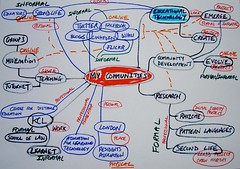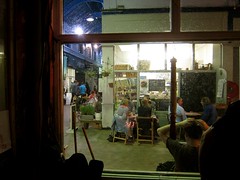The summer has been consuming, so the past couple of weeks have been a combination of finishing final edits on my book with Oxford University Press, taking care of loose-ends, and then taking a moment to breathe. Besides spending time with my family, I've been taking a leisurely look through a stack of Bibles I've collected around the house.
Since coming back from Michigan, by far the most important thing I've worked on is completing the final set of revisions for my book,
Worship across the Racial Divide, coming out early 2012 with Oxford University Press. These are the "copyedited" files from Oxford that are worked through before being sent to the typesetter for producing the "proof sheets."
What's critical about the copyedited files is that this becomes the LAST CHANCE to make any substantive changes in the document. And I ended up making quite a few.
|
| Making Last Changes to Manuscript before Printing? |
The last stages of writing a book manuscript for me is a combination of relief and panic.
Relief that this is a critical stage before having an actual printed book in hand, a copy that I will send to my parents, and a copy I will carry around with me to show anyone who'll listen (at the gym, the grocery store, the gas station... you get the picture). But --
Panic that this is the final push before sending off to press, a final opportunity to craft what I'm going to say.
So the past two weeks have been an effort to further weave together the core narrative, accentuating key points, highlighting the main contribution. New thoughts, new arguments keep coming up as I re-read the book, like the relationship of musical taste to church music. I keep finding insights that relate to my book. For example, I read an interesting article saying that
as the level of education increases, "musical tolerance" also increases. Yet the same research also shows that genres whose fans have the least education (
gospel, country, rap, heavy metal) are most rejected by these “musically tolerant” people.
In contrast to such “taste-based” findings, I find situational dynamics in multiracial churches encourage all members (regardless of race, regardless of education) to strongly favor gospel music. The musical tastes members bring to their churches are not nearly as important as the situational dynamics of race/music/worship within their church. Individual musical taste is subdued in relation to value for highlighting notions of race-based diversity in multiracial churches. Even more, a person's overall musical preference is subdued in relation to desire for people to connect with others in apart from specific genre(s) of church music.
Also on re-reading the book, the most surprising thread of argument is how important the notion of African American musicality is. All people have profound notions of how "black people" relate to music. It is an incredibly persistent theme.
African Americans bear the weight of diversity in multiracial churches in so many ways, even when few or no blacks attend the church. I can tell you that Chapter 3 on African Americans singing gospel music as the icon of "true worship" will be worth the price of the whole book. Add Chapter 7 on the importance of "gospel choirs" for multiracial worship, and I think it will be an interesting, surprising set of insights. I hope you all enjoy it!
Besides working through the copyedits for my book, I've seen a few movies, caught up on sleep, went swimming and bowling with my family. There's always quite a bit of mail (physical) and email to catch up on, and some new writing projects I'm working through. Plenty to do.
|
| The Marvel of the "Study Bible" |
Perhaps most surprisingly, I found myself reviewing a dozen or so Bibles I have around the house. Perhaps finishing my own "tome" has got me thinking about others lying around the house....
Some of the Bibles are new (
New Oxford Annotated NRSV 4th Edition,
MacArthur Study NASB Updated,
NIV 2011) but most are quite old (
Newberry Reference Bible Portable Edition 1893,
Original Scofield 1917 edition,
Revised Scofield 1967 edition,
Dickson's New Analytical Indexed 1950,
Dake's Annotated 1963 alongside the
2006 revised version). These various study editions, nearly all in the King James Version, represent aggressive attempts to systematize the scriptures, lending helps and reference points before, after, and throughout the text.
In a time before computers, the work of notation and typesetting in these "study bibles" would have been fantastically demanding. It is hard for us to imagine the amount of time and passion that went into the construction of these books. We may be too casual in seeing how these "mini-libraries" seem widely available today. Yet, I find that holding these books in my hand and working through the 1000+ pages of notations, I am overwhelmed with the amount of thinking and striving for coherence and accuracy represented in these works.
Given the
400th anniversary of the King James Version, it seems relevant that most of my looking through bibles has involved this version. I have a replica of the
first edition of the KJV published this year by Oxford (a truly giant book) and one of the most interesting things about it is how much "study" material is included in this book. Modern translations have not been soley about "text," but nearly always about helping ordinary people make sense of the text, with generous help from translators and editors.
For me, the most intriguing places to look in these bibles is Genesis and Exodus, then Matthew and Revelation. Here are the places where the notes go crazy, with long footnotes, bulging cross-references, and fascinating sub-headings. I'm just today going through the building of the Tabernacle and the equipping of the High Priest (Exodus 23-28). Fascinating in any one of these bibles; supremely interesting when comparing several of them.
I'll round out the summer with attending the American Sociological Association Meetings, and the Association for the Sociology of Religion Meetings, both held in Las Vegas toward the end of August. If you're there, maybe I'll see you at the buffet line!































